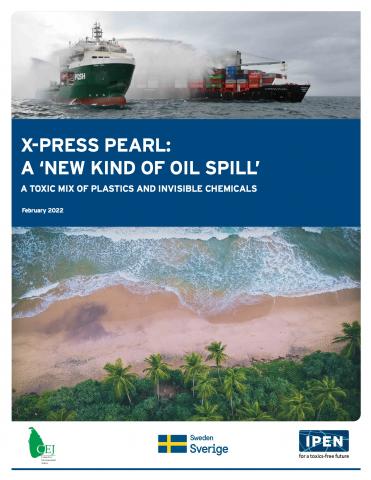X-Press Pearl: A 'New kind of oil spill'

In May 2021, the cargo ship X-Press Pearl caught fire outside of Sri Lanka. After the first wave of air pollution, the second wave of pollutants hit the beaches. It consisted of lost cargo, including billions of plastic pellets (microplastics used to produce plastics). Through summarizing the events leading up to and following the fire, analyzing plastics found on the beaches for toxic chemicals, and interviewing 107 fishermen and other locals, this report looks at:
- the chemical pollutants and their potential consequence
- the socioeconomic impacts and
- how to move forward to mitigate the situation and to prevent future similar disasters.
Throughout the study it has been evident that the consequences from the fire on board X-Press Pearl are, however, far more complex than just the visible debris found on the beaches. The analytical results tell a tale of pollutants matching the complexity of the cargo on board the ship, confirming that the consequences don’t only consist of the physical pollutants, but also chemical ones. The fishermen tell of lost income, destroyed nets, decreased catch, changes in the sea, and in some cases allergic symptoms following the accident.
If all the different types of chemicals, metals, and hazardous cargo leached out, the consequences are comprised of a mix of endocrine-disrupting bisphenols, metals that don’t have exposure limits that can be considered safe, cancer-causing PAHs, toxic plastic additives, and corrosive caustic soda. With increasing shipping, complex mixtures of chemicals, and regulations that have not caught up with the currently prevalent massive container ships, accidents like this must be considered the oil spills of our time. It is therefore crucial that prevention, mitigation, and regulatory measures are adapted to today’s shipping patterns to protect coastal communities and prevent similar disasters in future.
| Attachment | Size |
|---|---|
| 5.64 MB |
